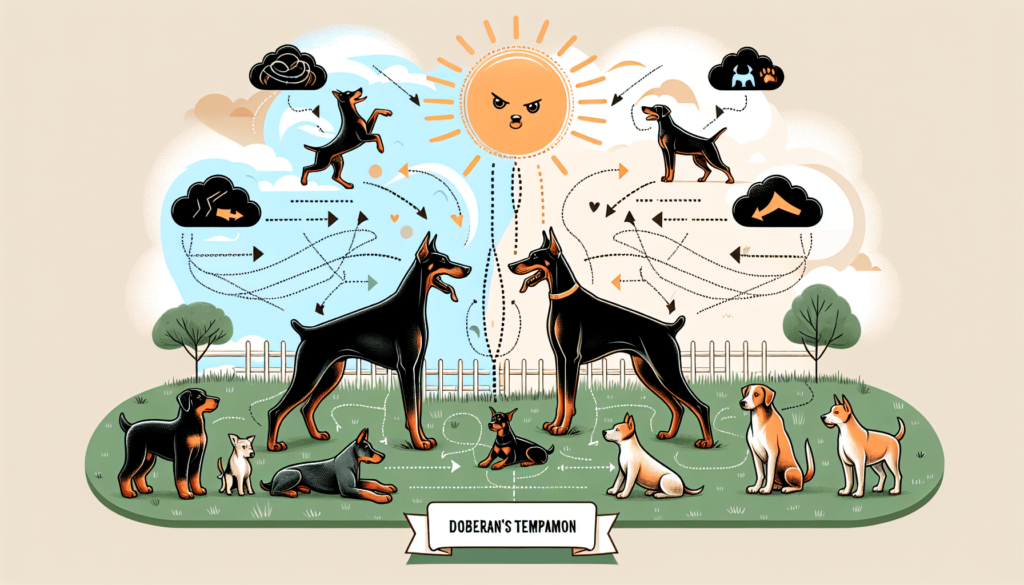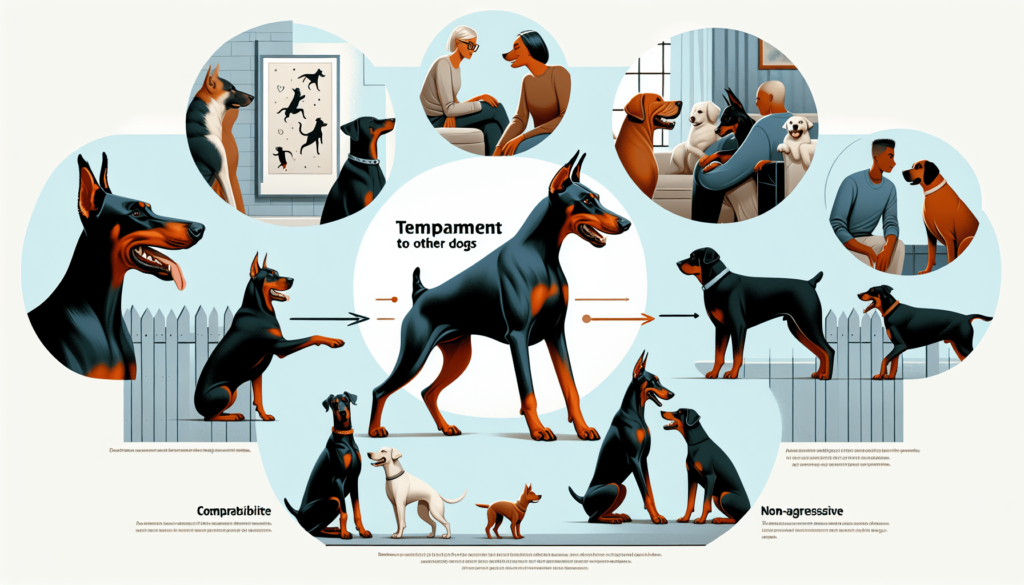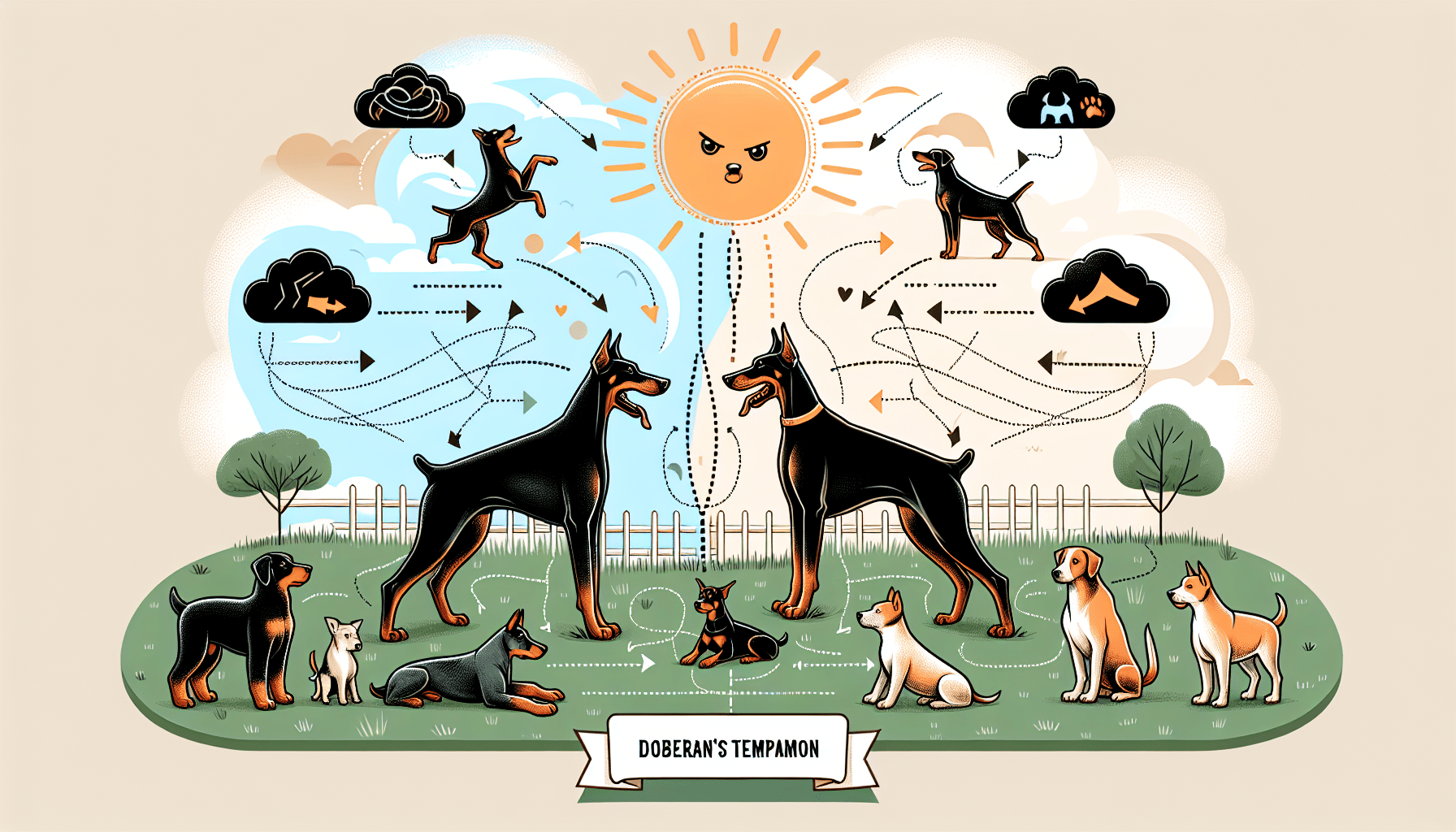Hey there, dog lovers! Ever wondered if Dobermans can be best buds with other four-legged pals? Today, we’re going to take a closer look at the social skills of these graceful and powerful dogs. Do Dobermans get along with other dogs? It’s a question that often pops up for potential Doberman owners and curious canine enthusiasts alike. So get ready to uncover the truth about these beautiful and majestic creatures and their relationships with their furry companions.
Understanding Doberman Temperament
Dobermans as Social Dogs
Dobermans are inherently social dogs and thrive on human companionship. They are loyal, affectionate, and enjoy being part of a family. Their strong bond with their owners often translates into their interactions with other dogs. While some Dobermans may have a natural inclination to get along with other dogs, it is important to remember that each dog is an individual and may have unique personality traits. Proper socialization and training from an early age can significantly influence a Doberman’s ability to get along with other dogs.
Dobermans as Protective Dogs
One of the defining characteristics of Dobermans is their protective nature. They have a strong instinct to guard and protect their family, which can sometimes extend to their interactions with other dogs. While this protective nature can be an asset in certain situations, it can also create challenges when trying to introduce a Doberman to unfamiliar dogs. It is essential to properly manage and guide their protective instincts to ensure harmonious relationships with other dogs.
Dobermans as Energetic Dogs
Dobermans are known for their high energy levels. They require regular exercise and mental stimulation to prevent boredom and destructive behaviors. This energy can manifest during interactions with other dogs, and if not appropriately channeled, it may lead to overexcitement or even aggression. Providing outlets for their energy through activities such as obedience training, agility, or regular exercise can help maintain a balanced and calm temperament when interacting with other dogs.
Factors Affecting Doberman’s Compatibility with Other Dogs
Early Socialization and Training
Early socialization is crucial in shaping a Doberman’s behavior towards other dogs. Exposing them to a variety of positive experiences with other dogs, people, and environments during their critical development period (between 3 and 14 weeks) can greatly influence their future interactions. Additionally, providing consistent training from an early age ensures that they learn proper manners and develop the necessary skills to navigate social situations with other dogs.
Gender and Neutering
The gender of Dobermans can sometimes play a role in their compatibility with other dogs. While individual personalities vary, intact males may display more dominant behavior, especially towards other male dogs. Neutering can help reduce territorial and dominance-related aggression. However, it is important to note that neutering alone is not a solution. Proper training and socialization are still essential in promoting positive interactions between Dobermans and other dogs, regardless of their gender.
Size and Breed of Other Dogs
The size and breed of other dogs can also influence a Doberman’s compatibility. Dobermans are generally medium to large-sized dogs, and compatibility with smaller or toy breeds may require extra care and supervision. It is important to consider the individual temperaments and energy levels of both the Doberman and the other dog when determining compatibility. Some breeds are known to have better compatibility with Dobermans, which can make the introduction and coexistence smoother and more enjoyable for all parties involved.

Dobermans in Multi-Dog Household
Introducing a New Dog to a Doberman
Introducing a new dog to a Doberman should be done gradually and with careful planning. It is crucial to provide a controlled and supervised environment during the initial introduction to ensure the safety and well-being of all dogs involved. Gradually increasing the amount of time spent together, starting with short and positive interactions, can help build familiarity and reduce any potential conflicts or anxieties.
Establishing a Hierarchy
Establishing a clear hierarchy within a multi-dog household is essential to maintain harmony and prevent dominance-related issues. Dogs, including Dobermans, are pack animals that naturally seek a structured hierarchy. Providing consistent rules, boundaries, and fair leadership can help prevent or minimize conflicts between dogs. It is important to establish yourself as the pack leader and ensure that all dogs understand and respect their place in the hierarchy.
Managing Play and Boundaries
Play between dogs is a natural and important part of their socialization process. However, it is crucial to monitor and manage play to prevent any undesirable behaviors or potential conflicts. Accurate supervision helps ensure that play remains appropriate and doesn’t escalate into aggression. Setting clear boundaries and redirecting any inappropriate behaviors can help maintain a healthy and enjoyable play dynamic among dogs in a multi-dog household.
Common Challenges with Dobermans and Other Dogs
Resource Guarding
Resource guarding is a behavior where a dog becomes possessive and protective of certain items, such as food, toys, or territory. Some Dobermans may exhibit resource guarding tendencies, which can potentially lead to conflicts with other dogs. Proper training and management techniques, such as teaching a solid “leave it” command and providing separate feeding areas or toys, can help mitigate the risk of resource guarding-related issues.
Dominance Aggression
Dobermans, like many other breeds, may exhibit dominance aggression towards other dogs. This can manifest as attempts to assert control or challenge the dominance of other dogs. Early socialization and obedience training play significant roles in managing dominance aggression. Teaching the Doberman to respond to commands and redirecting their focus away from challenging behaviors can help establish a more positive and cooperative relationship with other dogs.
Prey Drive
Dobermans have a strong prey drive, which can create challenges when introducing them to smaller animals or dogs with a prey-like appearance, such as small breeds or certain toy breeds. Proper training and consistent reinforcement can help redirect and manage their prey drive in a way that promotes safe and appropriate interactions with other dogs. It is essential to provide a controlled environment and never leave a Doberman unattended with smaller animals.

Tips for Successful Dog Socialization
Start Early and Gradually
Early socialization is key to ensuring a Doberman’s positive interactions with other dogs. Starting the socialization process as early as possible, between 3 and 14 weeks, exposes the dog to various stimuli and helps shape their perception of the world. Gradually exposing the Doberman to different environments, people, and dogs in controlled and positive ways allows them to develop confidence and good social skills.
Use Positive Reinforcement
Positive reinforcement is a highly effective training method that rewards desired behaviors with praise, treats, or play. Using positive reinforcement during socialization helps associate positive experiences with other dogs, promoting friendly and cooperative behavior. Rewarding the Doberman for calm and appropriate interactions with other dogs encourages them to repeat those behaviors in the future.
Observe and Manage Interactions
Carefully observing and managing interactions between a Doberman and other dogs is crucial in ensuring their compatibility. Being attentive to body language and cues can help identify signs of anxiety, fear, or aggression. It is important to intervene and redirect the dogs’ focus if any negative behaviors arise. Consistently reinforcing positive interactions and stepping in when necessary helps create a safe and enjoyable environment for all dogs involved.
Training Dobermans for Interactions with Other Dogs
Basic Obedience Training
Basic obedience training is a foundation for successful interactions between a Doberman and other dogs. Teaching basic commands such as “sit,” “stay,” and “leave it” not only establishes communication but also helps redirect their focus away from potential conflicts. Obedience training provides the Doberman with the necessary skills to respond to commands in social situations, promoting safe and respectful interactions.
Teaching Proper Socialization Skills
Teaching a Doberman proper socialization skills involves exposing them to a variety of situations, environments, and dogs while maintaining control and positive reinforcement. Gradually introducing them to different dogs, both individually and in group settings, helps develop their socialization skills and builds their confidence. Exposing them to different sizes, breeds, and energy levels of dogs allows the Doberman to learn appropriate behaviors and adapt to a wider range of social situations.
Seeking Professional Help
If a Doberman displays challenging behaviors or has had negative experiences with other dogs, seeking professional help from a qualified dog trainer or behaviorist is highly recommended. These professionals can assess the specific situation, provide tailored training plans, and guide both the Doberman and its owner in overcoming any obstacles. Professional guidance can significantly enhance the Doberman’s compatibility and socialization skills.
Finding Compatible Dog Breeds for Dobermans
Consideration for Size and Energy Levels
Finding compatible dog breeds for Dobermans involves considering factors such as size and energy levels. Choosing a breed that is similar in size or slightly smaller helps reduce the risk of potential conflicts. Additionally, ensuring that the energy levels of the Doberman and the other dog are relatively compatible can help establish a harmonious relationship, as mismatched energy levels can lead to frustration or incompatible play styles.
Temperament and Compatibility
Considering the temperament and overall compatibility between the Doberman and other breeds is crucial. Some breeds are known to have better compatibility with Dobermans due to their similar personality traits and temperaments. For example, breeds that are also protective or have a higher tolerance for assertive behavior may be more compatible with the Doberman’s temperament. Researching and consulting with experienced breeders or trainers can provide valuable insights when selecting a compatible breed.
Breeds Known to Get Along with Dobermans
While every dog is an individual, some breeds are known to have a better track record of getting along with Dobermans. Breeds such as the Labrador Retriever, Golden Retriever, Boxer, and German Shepherd often show good compatibility with Dobermans. These breeds are known for their friendly and adaptable nature, making them potential good matches for a Doberman in a multi-dog household. However, it is important to remember that proper introductions and socialization are still necessary to ensure a successful coexistence.
Rescued Dobermans and Their Compatibility
Assessing Past Experiences
Rescued Dobermans may come with a history that can affect their compatibility with other dogs. It is essential to assess and understand their past experiences, such as previous interactions with dogs or any potential trauma. This information helps determine the appropriate approach to socialization and training, as well as any potential challenges that may arise during the process.
Slow Introduction to Other Dogs
Rescued Dobermans may require a slower and more gradual approach when being introduced to other dogs. It is important to respect their individual needs and provide them with a safe and controlled environment. Gradually introducing them to well-mannered and stable dogs can help them build confidence and positive associations with other dogs. Patience, consistency, and professional guidance can greatly contribute to their successful integration into a multi-dog household.
Seeking Help from Dog Behaviorists
Rescued Dobermans with a complex history or challenging behaviors may benefit from the expertise of a dog behaviorist. These professionals specialize in understanding and addressing behavioral issues in dogs, including compatibility with other dogs. They can provide personalized training plans and work closely with the Doberman and its owner to ensure a smooth and successful transition into a multi-dog household.
Issues to Watch Out for Dobermans and Other Dogs
Aggressive Behaviors
Dobermans, like any other breed, have the potential to display aggressive behaviors towards other dogs. It is important to be vigilant and address any signs of aggression promptly. Seeking professional help in managing and modifying aggressive behaviors is essential for the safety and well-being of all dogs involved. Early intervention and proper training significantly increase the chances of resolving aggression-related issues.
Territoriality and Possessiveness
Dobermans can exhibit territorial and possessive behaviors, which may create challenges when introducing them to other dogs. Proper management and training can help temper these behaviors and prevent potential conflicts. Providing separate spaces and resources for each dog, monitoring interactions, and teaching appropriate boundaries are essential for maintaining a harmonious multi-dog household.
Inability to Properly Socialize
In some cases, Dobermans may struggle with socialization due to past experiences, fear, or anxiety. Inability to properly socialize can lead to behavioral issues when interacting with other dogs. Professional help from a qualified trainer or behaviorist can significantly assist in overcoming these challenges. They can provide specialized training techniques and guidance to help the Doberman develop the necessary social skills for successful interactions.
Professional Opinions on Doberman’s Compatibility
Veterinarians’ Perspectives
Veterinarians often provide valuable insights into a Doberman’s compatibility with other dogs. They can assess the individual dog’s behavior, temperament, and health, and offer advice or referrals to trainers or behaviorists if necessary. Veterinarians play an important role in promoting the overall well-being and socialization of Dobermans.
Dog Trainers’ Insights
Professional dog trainers have first-hand experience in working with Dobermans and can offer valuable insights into their compatibility with other dogs. They can assess the specific needs and behaviors of the Doberman, provide tailored training plans, and guide both the dog’s owner and the Doberman through the socialization process. Their expertise can greatly contribute to achieving successful and enjoyable interactions with other dogs.
Experiences from Doberman Owners
The experiences and anecdotes from other Doberman owners can provide valuable perspectives on their compatibility with other dogs. They can share tips, challenges, and successes in integrating their Dobermans into multi-dog households. Engaging with online forums, breed-specific clubs, or local community groups can connect Doberman owners and provide a supportive network for sharing and learning from each other’s experiences.
In conclusion, Dobermans can get along with other dogs when provided with proper socialization, training, and management. Their inherent social nature, protective instincts, and high energy can be channeled in a positive way to foster compatibility. Factors such as early socialization, gender and neutering, and the size and breed of other dogs play significant roles in determining a Doberman’s compatibility. By understanding the potential challenges, seeking professional help when needed, and following appropriate training techniques, Doberman owners can create a harmonious and enjoyable environment for their dogs and other canine companions.
